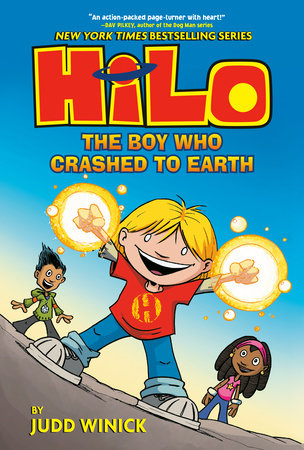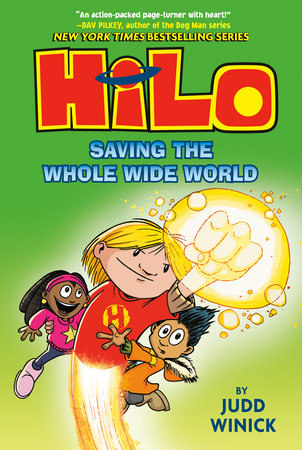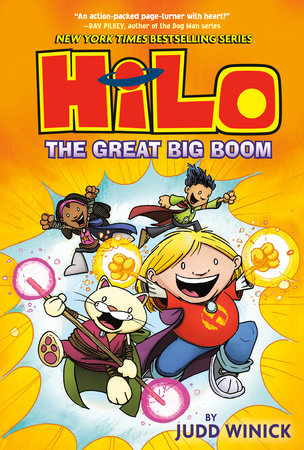Graphic Novels? Yeah, They’re Fun for the WHOLE Family
by Judd Winick
In all my research (of which I have done none) I have found LOTS of reasons why comics and graphic novels are great for the entire family, and I mean everybody — moms, dads, kids, really smart pets — everybody. I will list them here for easy reference:
1. Everybody can share graphic novels and comics.
Many, many graphic novels and comic book collections are all-ages. And I don’t mean that the books are simple enough that various ages are able to read them, I mean that the intended audience for the books is everybody. They’ve been written and drawn with the very idea that anybody of any age will enjoy them. You remember comic strips? (They used to be published daily in newspapers, which were like iPads made of paper that had current events on them.) Daily comic strips were not made for kids, they were made for newspaper readers, as in, adults — BUT they were fun for all. For Better or For Worse and Calvin and Hobbes are perfect examples of comic strip collections that were acceptable for everyone. Each week these strips were like a small story. In For Better or For Worse the characters even grew up and evolved over time.
Graphic novels like the Amulet series or *cough* Hilo are terrific for both young and old readers because they are solid stories. A parent can read a book like that (and do so pretty quickly) and then actually get to discuss the book with their kids.
2. It’s better than going to an all-ages movie.
We’re getting loaded with family-friendly, all-ages movies — mostly animated, and that makes me a happy cartooning camper — and most of the films are amazing. But despite the fact that the whole family can watch them, it’s hard to share them afterwards. Ask a kid what their favorite part of movie was, and you’re probably going to get a general answer.
Kid: “I liked that big fish.”
Grown-up: “The whale?”
Kid: “Yes. That whale was funny.”
Movies fly by, even when you are watching at home. In a comic, which is like holding a little movie in your hands, a kid can point right to a page, a panel, a face, and tell you oodles about what they’re digging on as it happens. Just try and pause a movie at a moment that you think is worthy of noting. I’d bet all the popcorn in the world that you’ll be faced with a kid saying, “Yeah, yeah, yeah — hit play” (and when I say “be faced with a kid”, well, they’re going be looking at the screen the whole time).
Reading together opens the discussion of storytelling and character. Just to have a visual story that can be held is a gateway to self-expression.
3. Graphic novels are easier to read.
YEAH, I SAID IT. Too often we comic creators, cartoonists, or even academics who love, teach, and support comics feel the need to defend graphic novels against prose. I will not. Comics are easier to read because of all the dang pictures. For the reluctant reader, the pictures provide a scaffolding. It lets them get into the story and fall in love with reading without struggling so hard with the mechanics. Hand a comic to kid who doesn’t like reading, and they will get sucked into the adventure and the characters — you’ll see them enjoy reading. With that foundation in place, they will learn, they will grow, and they will tackle books of prose because escaping into a book will already be familiar.
[RELATED: Why Graphic Novels Are Storytelling Quicksand for Reluctant Readers]
4. Curling up with a kiddo and a graphic novel is the best.
Lastly, you can physically share a book, and the share the experience of reading it together. Try reading a graphic novel with a child and you’ll see they HAVE to pluck down RIGHT next to you, shoulder to shoulder, in order to follow along. You read, you point to each panel, you make funny voices and sound effects. You bring this movie in your hands to life. You’re in the story together. What’s better than that?
Judd Winick is the author of Brightly’s Book Club for Kids pick Hilo: The Boy Who Crashed to Earth. Click here to learn more about the book, discover activities and tips for discussion inspired by Hilo, and join in on the reading fun.
-
Books in the Hilo Series:
-
Hilo: The Boy Who Crashed to Earth
Also available from:Hilo Book 2: Saving the Whole Wide World
Also available from:Hilo Book 3: The Great Big Boom
Also available from:



